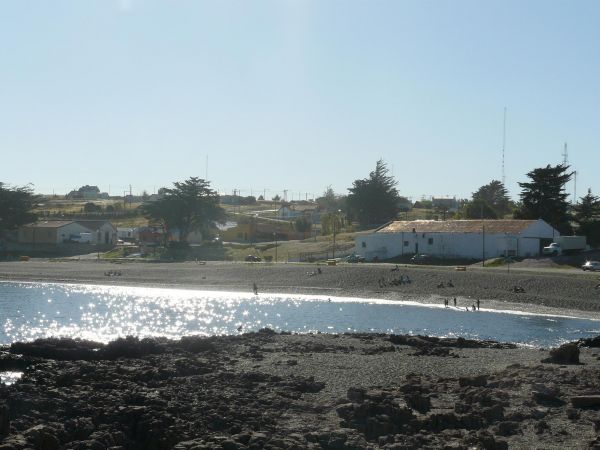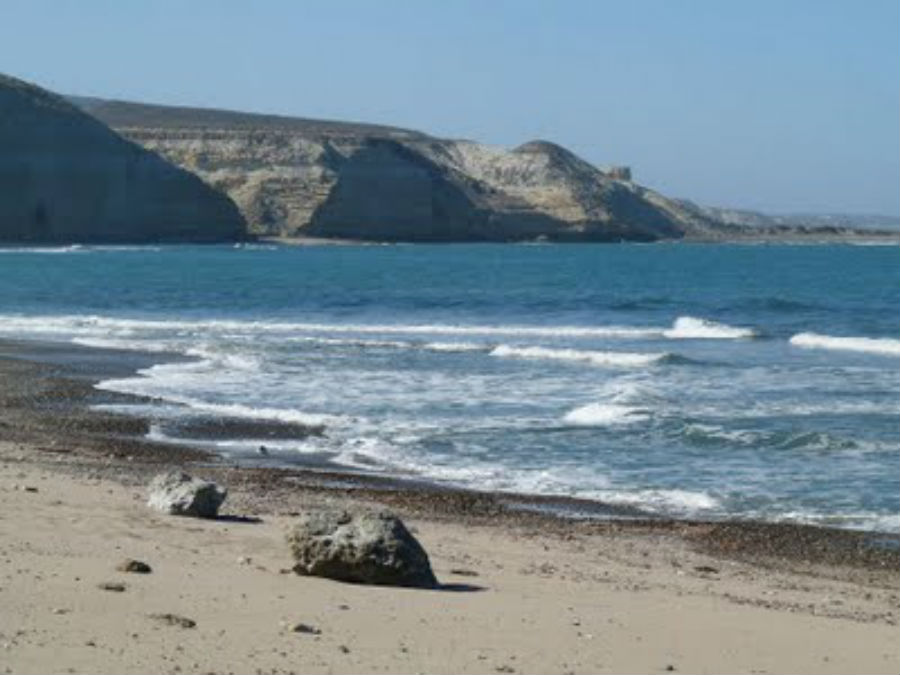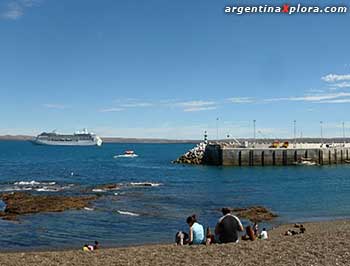Camarones (Chubut)
Camarones is a place in southern Argentina, located in the eastern province of Chubut on the Atlantic coast of Patagonia. It has 1,079 inhabitants ( 2001 census ) and is the capital of the department of Florentino Ameghino.
Geography
Camarones is located in the Bahía de Camarones, a large bay in the midst of an irregularly shaped coastal area, which is characterized by many peninsulas, bays, capes and small island groups, such as the location upstream Islas Blancas. 30 km southeast is the Cape Dos Bahías at which the Reseva Natural Faunística Cabo Dos Bahías, a well-known nature reserve with abundant wildlife ( penguins, sea lions ) is located.
The climate is temperate, but windy and dry. There are about 200 millimeters of precipitation per year, especially in winter. The temperature in January is 19 ° C and in July at 7 ° C. The Bahía de Camarones is the southernmost point of the Atlantic coast of Argentina, which is affected throughout the year by the warm Brazil Current and therefore increased water temperatures (in summer up to 20 ° C).
History
Founded in the town was in 1900. It developed over time into a service center to the very sparsely populated surrounding region, are held mostly in the sheep. However, this industry was in the 1980s in a deep crisis, which is why the residents are now trying to develop alternative sources of income such as tourism and commercialization of seafood new job opportunities.
In 2003 there was a scandal in the town, as a case of arson was known to a radio station that had broadcast critical reviews on the official leadership of the local mayor.
Culture and sights
The architecture of the town consists mainly of houses made of corrugated iron and red brick, reminiscent of long past times. There is a simple, built of boulders church, a remarkable old general store and a small tower (Torreón ), which is known as a lookout.
The most famous event of the year is the Fiesta del Salmón ( Salmon Festival ) in late January, to take place at the Fischerwettberwerbe and other events. Camarones bills itself as the Capital Nacional del Salmón, the "capital of the salmon ."
Economy and infrastructure
Industries
The town lives on fishing and processing of algae. He is also a service center for the surrounding estancias, where sheep are kept mainly. After the place a certain type of wool ( tipo Camarones ) is named. However, the traditional economic activities are affected by a severe crisis since the 1980s, so Camarones today has high unemployment.
To spite of the poor labor market situation to move the younger residents to stay, passing a project for commercialization of cultured marine animals since 1999 by the local school, which was considered in 2002 by the parastatal oil company YPF a prize for innovation and today from multiple locations in South and Central America is imitated.
Tourism
Since the 1980s, there are some tourism around the resort, which is related mainly to the nature reserve of Cabo Dos Bahías, which houses the second largest penguin colony in Argentina, among others. Also to be found between the village of Camarones and the Cape, which lies about 30 kilometers south-east, several beaches. In the Caleta Sara, a bay near the cape, there are a few holiday camps and recreational grounds.
Traffic
The connections to the transport network in Argentina is via the paved Ruta Provincial 30, which connects the village to the major north -south link Ruta Nacional 3. Public transport is sparse ( buses to Garayalde on the Route 3 and Trelew ). There is also a landing strip for small planes, but which is hardly used.










